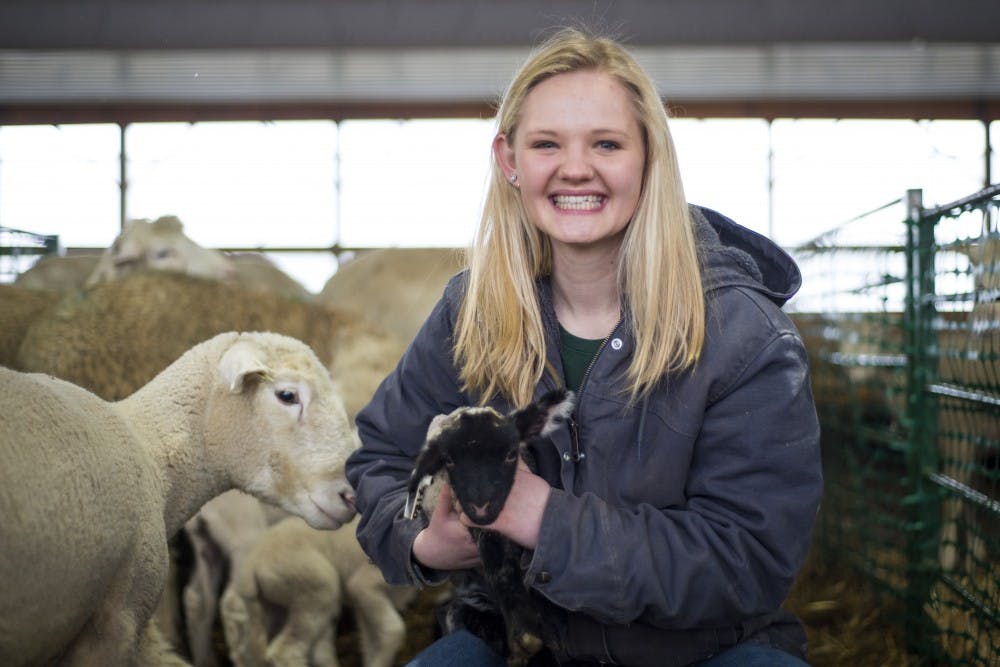
An alarm clock goes off for the third time during the night. Animal science sophomore Emmy Schuurmans gets herself up, takes her drive to the barn and does a routine check on her pregnant sheep and the newborn lambs at the MSU Sheep Teaching and Research Center.
It’s midnight.
Schuurmans began working at the MSU Sheep Teaching and Research Center in the fall, but starting this semester she is living on the farm on her own to ensure the newborns are delivered safely with proper care.
Schuurmans grew up on a dairy farm, where she would get up at 2 a.m. to milk the cows every Sunday, so working with animals, specifically production farming, has always been her passion.
“Sometimes it is a little lonely, but I grew up in the middle of nowhere and so it kind of feels like home,” Schuurmans said. “That was the one thing that I missed my freshman year ... not being around animals all the time anymore.”
Her duties during lambing season, which begins in the middle of January, includes drying off the lambs after they are born, ensuring the sheep and their newborns are put in an individual pen to properly bond, weighing the lamb and writing down details such as the date of birth and the mother’s number.
“A lot of people want to do cats and dogs because everyone loves kittens and puppies,” Schuurmans said. “Not a lot of people who go into vet schools think food animals need to be taken care of too, so that’s what I want to do.”
One of the most important duties for Schuurmans is to assist if the sheep are experiencing a difficult birth, which can be caused by the mother having too narrow of a pelvis or the lamb being positioned backward.
“Humans get one on one interaction, the doctor is always watching them and everything so you don’t really hear of it as much because they’re watching the baby all the time,” Schuurmans said. “They’re taking ultrasounds all the time, making sure the baby is in the right position, and we can’t do that with every sheep here.”
When a sheep is in labor it lays with its head down, and usually if they’ve been in that position for too long there is something wrong. Schuurmans sometimes must help with the birth by herself in the middle of the night.
“One time there was two babies coming out at the same time and so if you don’t catch it in time, then the babies eventually don’t make it,” Schuurmans said. “But what really makes up for it is when you do get one that’s alive.”
The first time Schuurmans helped a sheep give birth at the MSU Sheep Teaching and Research Center with farm manager Joe Leszcz, she had to wear a glove that went up to her shoulder. It took 30 minutes, and she had to feel for the lamb’s legs and pull out the newborn from the tight space.
“I get to see young people like Emmy develop as they work here and gain in their skills and their knowledge,” Leszcz said. “That’s the really rewarding thing about being out here.”
Leszcz takes the male lambs that weigh more than 60 pounds to an auction where they are often sold to buyers from Detroit, whereas the female lambs are typically added back to the flock.
“A lot of people think that it’s for wool production, but we actually lose money when we shear them,” Schuurmans said. “Wool doesn’t really make a lot of money for sheep farmers. We just have to do it for the health of the animal really.”
At the farm, Schuurmans and other student workers also watch for the sheep’s health, treating them with antibiotics if they contract mastitis, an infection in the mammary glands and checking for other injuries in both the lambs and sheep.
“Sometimes the utter will swell up and be kind of reddish and looks inflamed,” Schuurmans said. “Also you have to test them, if you milk her out it kind of looks like cottage cheese almost.”
Other duties at the MSU Sheep Teaching and Research Center include feeding, bedding and working at the barn, which is open to the public from 8 a.m. to 4:30 p.m.
“Farms sometimes have a bad rap, that farmers don’t care about their animals,” Schuurmans said. “But people put in a lot of effort to make sure the animals are healthy and happy.”







